Selected medicinal plants for use with the Aromed vaporizer.
Alant root, ashwaganda root, valerian root, basil herb, damiana, dream herb, verbena, eucalyptus leaves, cloves, ginkgo leaves, guarana, hemp, hops glands, st. John’s wort, chamomile flowers, lavender flowers, linden blossoms, lobelia herb, yerba mate, lemon balm leaves, clary sage flowers, parsley fruits, peppermint leaves, quebracho bark, rosemary leaves, sweet vernal grass, sage leaves, yarrow flowers, snake root roots, coneflower root, steppe rue seeds, labrador tea herb, tea leaves, thyme herb, tulasi herb vanilla grass herb, juniper berries, willow bark, hawthorn flowers, vermouth herb mexican, wild lettuce leaves
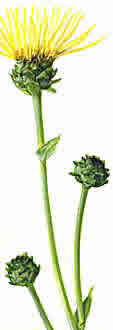 Alant root (inulae hellenii rhizoma)
Alant root (inulae hellenii rhizoma)
Boiling point: 130 °C
Effect(s) of symptom(s):
- cough-suppressing and expectorant for coughs, colds and pharyngitis
- calming and antidepressant for insomnia and menstrual cramps
Note: Drink plenty of water during use. Hypersensitivity can cause allergies!
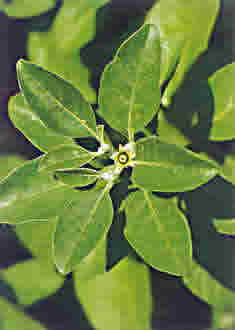 Ashwagandha root (withaniae somniferae radix)
Ashwagandha root (withaniae somniferae radix)
Boiling point: 190 °C
Effect(s) of symptom(s):
- tonic in kidney and bladder diseases
- antidepressant for insomnia
- antidepressant and toning in menstrual disorders
- tonic in heart disease
Note: A good substitute for sleeping pills, especially in conjunction with valerian. The common name for Ashwaganda is Schlafbeere.
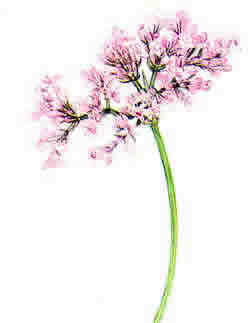 Valerian Root (valerianae radix)
Valerian Root (valerianae radix)
Boiling point: 235 °C
Effect(s) of symptom(s):
- calming in insomnia
Note: Tried and tested home remedy. Good effect in mixtures with ashwaganda, lemon balm and hawthorn.
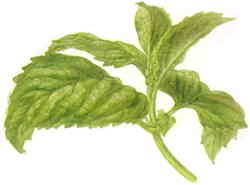 Basil herb (basilici herba)
Basil herb (basilici herba)
Boiling point: 130 °C
Effect(s) of symptom(s):
- Cough-suppressing cough, colds and pharyngitis
Note: Especially effective in combination with sage.
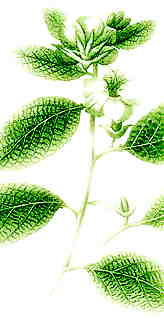 Damiana (turnera diffusae herba)
Damiana (turnera diffusae herba)
Boiling point: 190 °C
Effect(s) of symptom(s):
- tonic in kidney and bladder diseases
- calming in insomnia
- tonifying, soothing for menstrual cramps
- soothing in heart disease
Note: In treatment (at least 1 week) Damiana is attributed a strong aphrodisiac effect.
 Dream herb (caleae zacatechichii herba)
Dream herb (caleae zacatechichii herba)
Boiling point: 190 °C
Effect(s) of symptom(s):
- soothing, diuretic in kidney and bladder diseases
- calming in insomnia
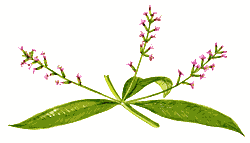 Verbena (verbenae herba)
Verbena (verbenae herba)
Boiling point: 130 °C
Effect(s) of symptom(s):
- diuretic in kidney and bladder diseases
Note: Well-tried home remedy, also in combination with willow bark. Strongly detoxifying.
 Eucalyptus leaves (eucalypti folium)
Eucalyptus leaves (eucalypti folium)
Boiling point: 130 °C
Effect(s) of symptom(s):
- disinfectant for gastrointestinal disorders
- disinfecting and expectorant for coughs, colds and pharyngitis
Note: Tried and tested home remedy. Some patients are hypersensitive to high dosage.
 Cloves (caryophylli flos)
Cloves (caryophylli flos)
Boiling point: 130 °C
Effect(s) of symptom(s):
- disinfecting, analgesic for stomach and intestinal disorders
- disinfectant, vasodilator, analgesic for cough, colds and pharyngitis
Note: Proven remedies throughout the Orient. In Indonesia clove cigarettes. In India for aromatherapy in fumigation.
 Ginkgo leaves (ginko folium)
Ginkgo leaves (ginko folium)
Boiling point: 130 °C
Effect(s) of symptom(s):
- Vasodilator for cough, colds and pharyngitis
- tonifying in insomnia
- vasodilator, toning during menstrual cramps
- Vasodilator in renal and bladder diseases
- tonic in heart disease
Note: Goethe’s tonic. Well known and proven.
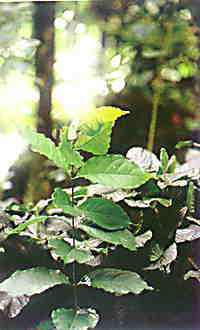 Guarana (guarana herba/pasta guarana)
Guarana (guarana herba/pasta guarana)
Boiling point: 190 °C
Effect(s) of symptom(s):
- stimulating with drive weakness
Note: Traditional stimulant from South America.
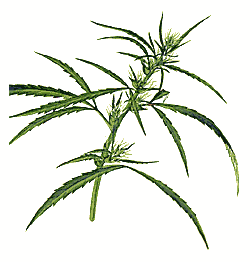 Hemp (cannabis herba)
Hemp (cannabis herba)
Boiling point: 190 °C
Effect(s) of symptom(s):
- antispasmodic, appetizing for stomach and intestinal disorders
- Diuretic in kidney and bladder diseases
- antidepressant, hypotensive in insomnia
- antidepressant, stimulant for menstrual complaints
Note: Illegally in Germany! However, there are possibilities for patients to legally obtain cannabis extracts such as dronabinol or marinol. Inquiries to ACM e.V.
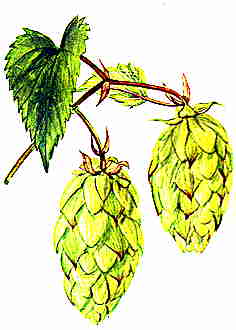 Hops glands (lupuli strobuli)
Hops glands (lupuli strobuli)
Boiling point: 130 °C
Effect(s) of symptom(s):
- calming in insomnia
- tonifying and calming for depression
Note: Tried and tested home remedy. With Ashwaganda against sleep disorders.
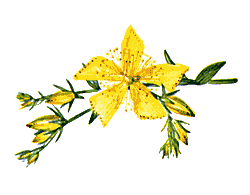 St. John’s Wort (hyperici herpa)
St. John’s Wort (hyperici herpa)
Boiling point: 190 °C
Effect(s) of symptom(s):
- calming, antidepressant for insomnia
- calming, toning, antidepressant for menstrual cramps
Note: Attention! Increases the UV radiation sensitivity. Do not sunbathe after use!
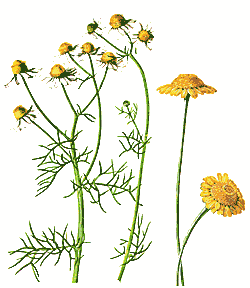 Chamomile flowers (matricariae flos)
Chamomile flowers (matricariae flos)
Boiling point: 130 °C
Effect(s) of symptom(s):
- anti-inflammatory in gastrointestinal disorders
- anti-inflammatory, cough suppressant for cough, colds and pharyngitis
- anti-inflammatory for menstrual disorders
Note: Tried and tested home remedy. Valued as a steam bath.
 Lavender flowers (lavendulae flos)
Lavender flowers (lavendulae flos)
Boiling point: 130 °C
Effect(s) of symptom(s):
- antidepressant, soothing in insomnia
- antidepressant, toning during menstrual cramps
- tonic in heart disease
- Anti-inflammatory for cough, colds and pharyngitis
Note: Tried-and-tested home remedies also in aromatherapy.
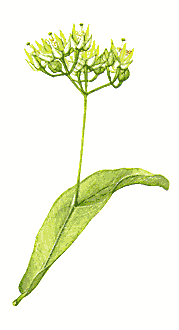 Linden blossoms (tiliae flos)
Linden blossoms (tiliae flos)
Boiling point: 130 °C
Effect(s) of symptom(s):
- anti-inflammatory, sweaty for cough, colds and pharyngitis
- stimulating, tonifying heart disease
Note: Tried and tested home remedy.
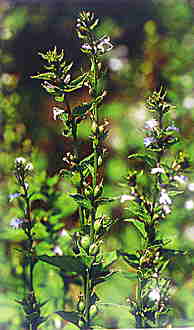 Lobelia herb (lobeliae inflatae herba)
Lobelia herb (lobeliae inflatae herba)
Boiling point: 130 °C
Effect(s) of symptom(s):
- antispasmodic in gastrointestinal disorders
- Cough-suppressing, antispasmodic, stimulant for cough, colds and pharyngitis
- stimulant in heart disease
Note: If the dosage is too high, nausea may occur! Stop treatment immediately!
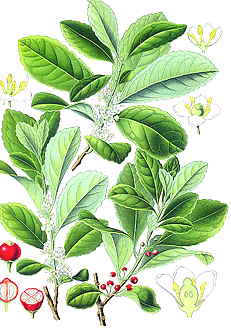 Yerba mate (ilex paraguinense folium)
Yerba mate (ilex paraguinense folium)
Boiling point: 190 °C
Effect(s) of symptom(s):
- stimulating, toning with drive weakness
Note: In South America for asthmatics and coffee substitutes.
 Lemon balm leaves (melissae folium)
Lemon balm leaves (melissae folium)
Boiling point: 130 °C
Effect(s) of symptom(s):
- antispasmodic in gastrointestinal disorders
- antispasmodic, soothing for menstrual cramps
- soothing in sleep disorders
Note: Tried and tested home remedy. Especially effective in mixtures: with clary sage in menstrual disorders, with ashwaganda, valerian and melissa in sleep disorders.
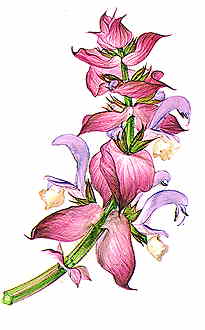 Clary sage flowers ( salvia sclareae flos )
Clary sage flowers ( salvia sclareae flos )
Boiling point: 190 °C
Effect(s) of symptom(s):
- antispasmodic in gastrointestinal disorders
- antispasmodic, toning for cough, colds and pharyngitis
- tonifying in insomnia
- antidepressant, antispasmodic, toning during menstrual cramps
Note: Basis for many mixtures. Very strong antispasmodic. Overdoses can lead to intoxication. Caution is advised!
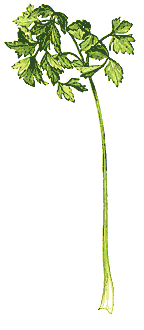 Parsley fruits (petroselini fructus)
Parsley fruits (petroselini fructus)
Boiling point: 130 °C
Effect(s) of symptom(s):
- antispasmodic in gastrointestinal disorders
- disinfectant for cough, colds and pharyngitis
- Diuretic in kidney and bladder diseases
Note: As kidney and bladder medicine traditionally in Europe. In aromatherapy also as a disinfectant. Do not use during pregnancy!
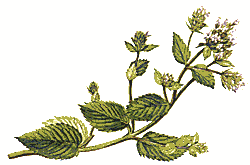 Peppermint leaves (menthae piperitae folium)
Peppermint leaves (menthae piperitae folium)
Boiling point: 130 °C
Effect(s) of symptom(s):
- antispasmodic in gastrointestinal disorders
- antispasmodic, toning for cough, colds and pharyngitis
- antispasmodic, tonic during menstrual cramps
- antispasmodic, tonifying in heart diseases
Note: Tried and tested home remedy.
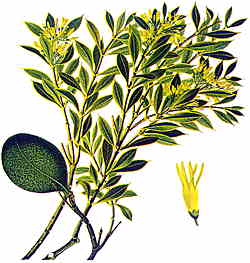 Quebracho bark (cortex quebracho blanco)
Quebracho bark (cortex quebracho blanco)
Boiling point: 190 °C
Effect(s) of symptom(s):
- vasodilator, expectorant for cough, colds and pharyngitis
- vasodilator in heart disease
Note: In the Andes of South America Quebracho is estimated as an aphrodisiac. At too high dosages nausea and vomiting have been observed.
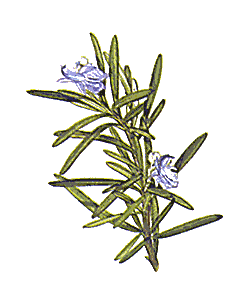 Rosemary leaves (rosmarini folium)
Rosemary leaves (rosmarini folium)
Boiling point: 130 °C
Effect(s) of symptom(s):
- stimulating, tonic during menstrual cramps
- stimulating, tonifying heart disease
- stimulating, toning with drive weakness
Note: Latin American home remedy. Do not use with pregnancy!
 Sweet vernal grass (anthoxanti odorati herba)
Sweet vernal grass (anthoxanti odorati herba)
Boiling point: 235 °C
Effect(s) of symptom(s):
- anti-inflammatory, cough suppressant for cough, colds and pharyngitis
Note: In Europe as a spice, in aromatherapy a long-proven medicinal herb.
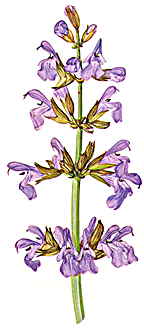 Sage leaves (salviae folium)
Sage leaves (salviae folium)
Boiling point: 190 °C
Effect(s) of symptom(s):
- antispasmodic in gastrointestinal disorders
- antispasmodic in gastrointestinal disorders…
Note: Tried and tested home remedy. If pregnant, ask the doctor!
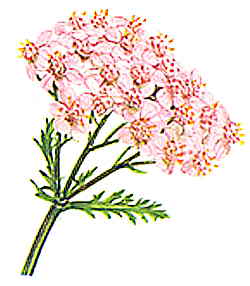 Yarrow flowers (millefolii flos)
Yarrow flowers (millefolii flos)
Boiling point: 190 °C
Effect(s) of symptom(s):
- anti-inflammatory in gastrointestinal disorders
- anti-inflammatory in gastrointestinal disorders…
Note: Tried and tested home remedy. There are allergic reactions, especially with fresh plant material known.
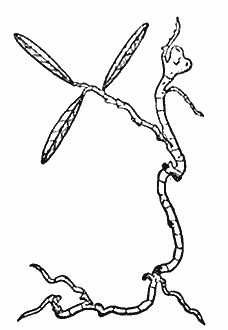 Snake root roots (rauwolfiae radix)
Snake root roots (rauwolfiae radix)
Boiling point: 130 °C
Effect(s) of symptom(s):
- antidepressants for insomnia
- antidepressants for menstrual cramps
- Hypotensive in heart disease
Note: Tried and tested home remedy. Long-term high-dose use may cause anxiety and depression.
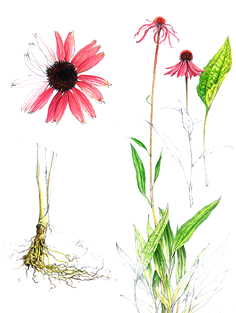 Coneflower root (echinacea angustifoliae radix)
Coneflower root (echinacea angustifoliae radix)
Boiling point: 130 °C
Effect(s) of symptom(s):
- anti-inflammatory in gastrointestinal disorders
- anti-inflammatory, disinfectant for cough, colds and pharyngitis
- anti-inflammatory in renal and bladder diseases
- antidepressant for insomnia
- anti-inflammatory, antidepressant for menstrual disorders
- antidepressive for heart disease
Note: Used by the North American Indians for millennia.
Steppe rue seeds  (peganum harmalae semen)
(peganum harmalae semen)
Boiling point: 190 °C
Effect(s) of symptom(s):
- calming in insomnia
- antidepressant, soothing for menstrual cramps
Note: The active ingredient Harmalin is a MAO inhibitor! Therefore do not use with medication together!
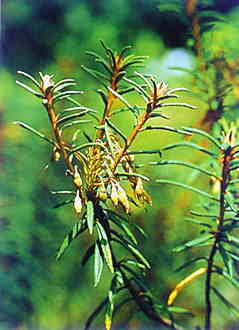 Labrador tea herb (ledum palustris herba)
Labrador tea herb (ledum palustris herba)
Boiling point: 190 °C
Effect(s) of symptom(s):
- antispasmodic in gastrointestinal disorders
- antispasmodic, vasodilator, cough suppressant for cough, colds and pharyngitis
- anticonvulsant in menstrual disorders
- anticonvulsant, vasodilator in heart disease
Note: Already mentioned by Hildegard von Bingen. Hypersensitivity reactions have been observed at high doses.
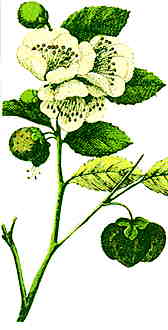 Tea leaves (thea nigra folium)
Tea leaves (thea nigra folium)
Boiling point: 190 °C
Effect(s) of symptom(s):
- stimulating with drive weakness
Note: When using, drink plenty of water.
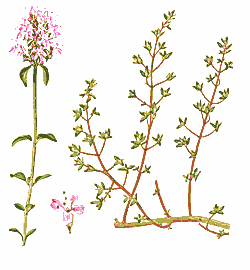 Thyme herb (thymi herba)
Thyme herb (thymi herba)
Boiling point: 190 °C
Effect(s) of symptom(s):
- disinfectant for gastrointestinal disorders
- disinfectant, cough suppresses cough, colds and pharyngitis
- Hypotensive in heart disease
Note: Well-tried home remedy, in many bronchial mixtures.
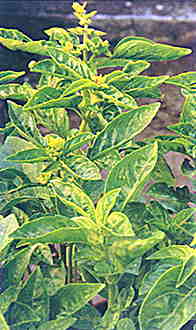 Tulasi herb (ocimum sancti herba)
Tulasi herb (ocimum sancti herba)
Boiling point: 190 °C
Effect(s) of symptom(s):
- cough-suppressing cough, colds and pharyngitis
- stimulating with drive weakness
 Vanilla grass herb (hierochloe odoratae herba)
Vanilla grass herb (hierochloe odoratae herba)
Boiling point: 130 °C
Effect(s) of symptom(s):
- analgesic in gastrointestinal disorders
- analgesic, anti-inflammatory for cough, colds and pharyngitis
- analgesic, anti-inflammatory for menstrual cramps
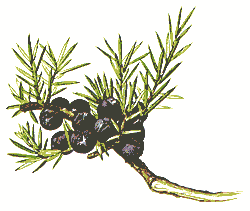 Juniper berries (juniperi fructus)
Juniper berries (juniperi fructus)
Boiling point: 190 °C
Effect(s) of symptom(s):
- diuretic in kidney and bladder diseases
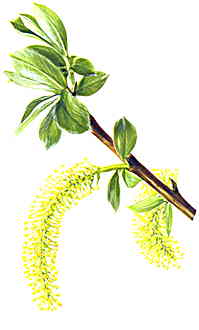 Willow bark (salicis cortex)
Willow bark (salicis cortex)
Boiling point: 235 °C
Effect(s) of symptom(s):
- analgesic in gastrointestinal disorders
- analgesic for cough, colds and pharyngitis
- analgesic for menstrual cramps
Note: The bark contains a previously widely used febrifuge, salicin, the raw material for aspirin ™.
 Hawthorn flowers (crataegus monogynae flos)
Hawthorn flowers (crataegus monogynae flos)
Boiling point: 190 °C
Effect(s) of symptom(s):
- tonic in heart disease
Note: As a cure reliable heart strengthening.
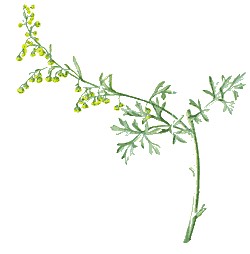 Vermouth herb mexican (artemisia mexicanae herba)
Vermouth herb mexican (artemisia mexicanae herba)
Boiling point: 190 °C
Effect(s) of symptom(s):
- disinfectant for gastrointestinal disorders
- disinfectant, toning for coughs, colds and pharyngitis
- disinfecting kidney and bladder diseases
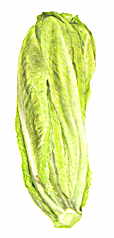 Wild lettuce leaves (lactucae virosae folium)
Wild lettuce leaves (lactucae virosae folium)
Boiling point: 190 °C
Effect(s) of symptom(s):
- analgesic in gastrointestinal disorders
- analgesic, soothing for coughs, colds and pharyngitis
- analgesic in renal and bladder diseases
- calming in insomnia
Note: Contains Laktuarin, a plant milk related to opium juice.


 Deutsch
Deutsch Español
Español